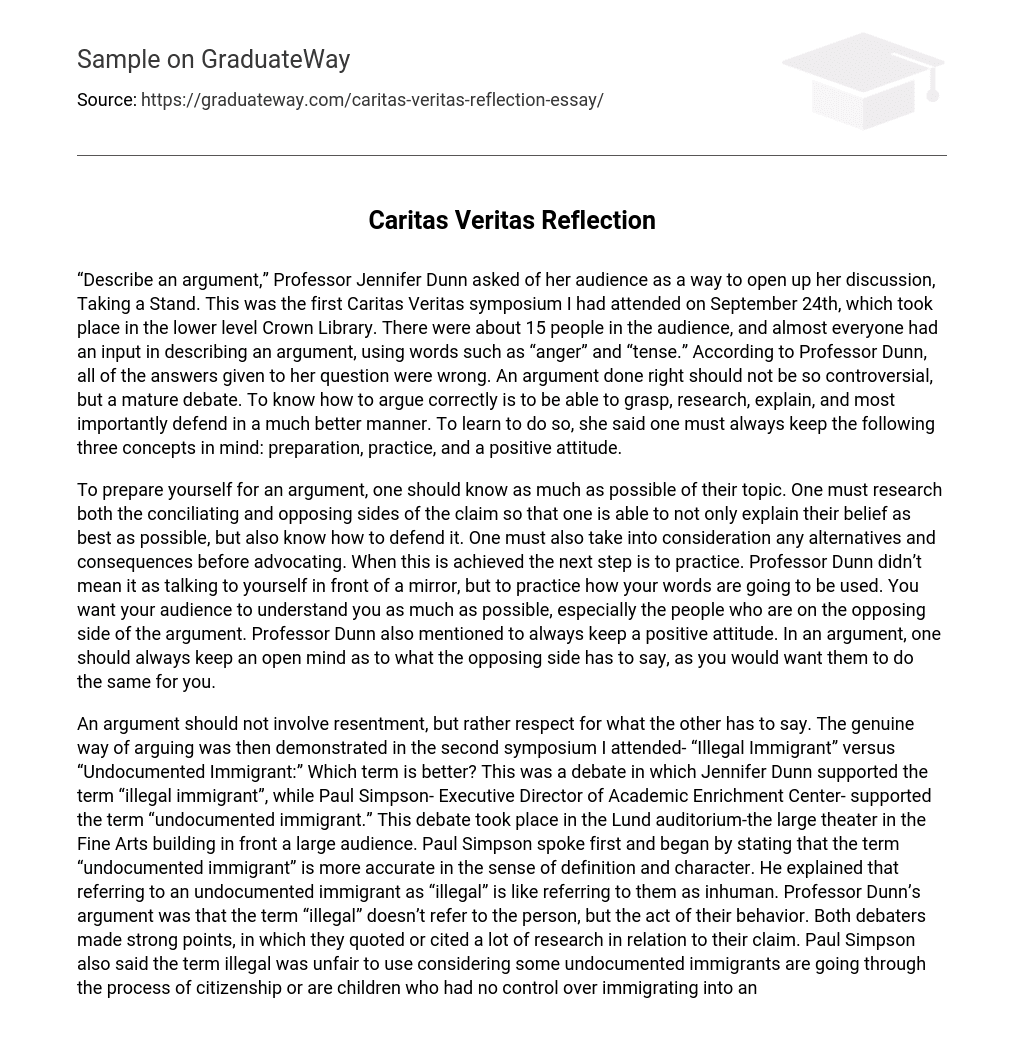During the Caritas Veritas symposium held on September 24th at Crown Library’s lower level, Professor Jennifer Dunn initiated her discussion entitled “Taking a Stand” by prompting attendees to define an argument. Approximately 15 individuals participated in this event, with each contributing their perspectives on characterizing an argument as being filled with tension and anger. However, Professor Dunn disputed these responses, asserting that a well-executed argument should not stir controversy but instead foster a mature debate. In her view, effectively engaging in arguments necessitates skills such as comprehension, research, explanation, and above all else, the ability to defend one’s position persuasively. To achieve mastery in this area, she underscored the significance of three key principles: preparation, practice, and maintaining a positive mindset.
In order to effectively prepare for an argument, it is crucial to thoroughly understand the topic by conducting comprehensive research on both supportive and opposing viewpoints. This allows one to express their own belief confidently and be ready to defend it. It is also important to consider alternative perspectives and potential consequences before presenting and advocating for one’s stance. Professor Dunn advises against rehearsing in front of a mirror but emphasizes considering how the audience, especially those with opposing views, will perceive one’s words. Additionally, maintaining a positive attitude throughout the argument is key. Being open-minded and actively listening to the opposing side encourages them to reciprocate, leading to a more effective and respectful exchange of ideas.
The text highlights the significance of respectful arguing rather than harboring resentment. It specifically delves into a symposium named “Illegal Immigrant” versus “Undocumented Immigrant: Which term is better?” in which Jennifer Dunn advocated for the term “illegal immigrant” and Paul Simpson supported the term “undocumented immigrant”. The symposium occurred in Lund auditorium, a spacious theater located within the Fine Arts building, with a substantial audience present.
Paul Simpson contended that the term “undocumented immigrant” is more accurate and considerate, whereas Professor Dunn asserted that the term “illegal” pertains to behavior rather than an individual. Both speakers provided research evidence and cited examples to support their arguments. Simpson stressed that using the term “illegal” unfairly stigmatizes those going through the citizenship process or children who have no control over their immigration status. Conversely, Professor Dunn maintained that all individuals can still be labeled as “illegal,” attributing its negative connotation to media influence.
At the conclusion of the debate, there was no clear victor or loser, but rather a demonstration of effective argumentation. Professor Dunn and Paul Simpson both provided comprehensive explanations for their claims and backed them with personal opinions. Furthermore, both participants maintained a high level of mutual respect throughout the debate. They spoke in a civil manner, posed and answered each other’s questions, and most importantly, attentively listened to opposing perspectives. Overall, I thoroughly enjoyed both lectures featured in the “Taking a Stand” symposium as they were captivating and educational. Professor Dunn highlighted the significance of mastering the art of arguing – an indispensable skill for all individuals. I understood the validity in her point that arguing is not about disproving others; it is about asserting one’s own beliefs. It is crucial to know where you stand on various aspects of life, whether it be within an academic seminar or in terms of political views. Therefore, investing sincere efforts into learning how to argue effectively becomes essential.
Mastering the art of debate is essential for personal growth, effective communication, and developing resilience. It enhances the chances of achieving success. Initially, I considered consistently practicing debate to be somewhat foolish. However, it led me to reflect on my skills in oral communication. Delivering a presentation in front of a large audience intimidates me as my thoughts tend to become disorganized when spoken aloud. Therefore, honing my speaking abilities through practice is crucial.
The second symposium titled “Illegal Immigrant” versus “Undocumented Immigrant: Which term is better” provided a valuable demonstration of an effective argument. Additionally, it addressed a prevalent controversy within this country.
The diversity of the United States was evident in the audience at the debate, highlighting the importance of Americans being aware of controversial issues. This debate offered an opportunity for those lacking knowledge to become informed. Personally, I regret not seeking advice from Professor Dunn on how to navigate societal pressure while defending my beliefs. It can be difficult to disregard ridicule or attempts to undermine our convictions. As for the second symposium, I am curious about how Professor Dunn and Paul Simpson effectively organized their thoughts and presentations using multiple sheets of paper. Understanding their decision-making process regarding the order and timing of points is intriguing. Attending the first symposium, “Taking a Stand,” is highly recommended as it offers valuable insights for everyone. Additionally, eagerly anticipating another debate between Professor Dunn and Paul Simpson would be worthwhile.





